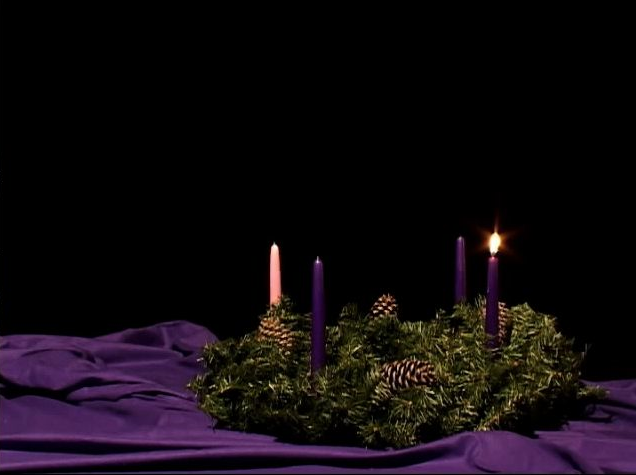And Death's Dark Shadow Put to Flight: Advent Hope for the Fall of Man
 As our culture grows ever more distant from Christ, and Christmas becomes ever more secular and material, the Season of Advent points to the Four Last Things. Last year in the first week of Advent, I wrote "A Corner of the Veil," a post that I've mentioned many times. It was about the death of my mother in November, 2006, and of how the injustice of my prison sentence impacted my relationship with her both in life and in death. You may not know that I borrowed the title of that special post from a wonderful little French novel entitled Le Coin du Voile (A Corner of the Veil) by Laurence Cosse (Scribner, 1996).It's a novel about the discovery of irrefutable proof of the existence of God and the permanence of His relationship with those who are faithful. The proof itself is never revealed - only its profound effect on everyone who reads it. Too bad. I would have loved to have shared it with Stephen Hawking!
As our culture grows ever more distant from Christ, and Christmas becomes ever more secular and material, the Season of Advent points to the Four Last Things. Last year in the first week of Advent, I wrote "A Corner of the Veil," a post that I've mentioned many times. It was about the death of my mother in November, 2006, and of how the injustice of my prison sentence impacted my relationship with her both in life and in death. You may not know that I borrowed the title of that special post from a wonderful little French novel entitled Le Coin du Voile (A Corner of the Veil) by Laurence Cosse (Scribner, 1996).It's a novel about the discovery of irrefutable proof of the existence of God and the permanence of His relationship with those who are faithful. The proof itself is never revealed - only its profound effect on everyone who reads it. Too bad. I would have loved to have shared it with Stephen Hawking!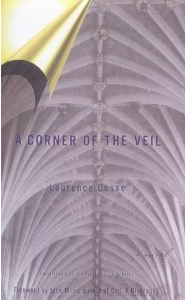 A Corner of the Veil - the novel, not the blog post - is a story both serious and funny - sometimes very funny - about a fictional order of priests called "The Casuists" who are unmistakably French Jesuits. One, an aging scholar, has as his life's career the task of refuting proofs of the existence of God - an odd endeavor for a priest. When he stumbles upon one that he cannot refute, he is suddenly faced with absolute proof, and it radically alters the comfortable world of dubious faith constructed in him and all around him.As my friend, Father Richard John Neuhaus wrote in Death on a Friday Afternoon, there is no more dubious place in which to confront faith than in the face of death - our own or that of those we love and cherish - and we will find no merit of our own worth pleading:
A Corner of the Veil - the novel, not the blog post - is a story both serious and funny - sometimes very funny - about a fictional order of priests called "The Casuists" who are unmistakably French Jesuits. One, an aging scholar, has as his life's career the task of refuting proofs of the existence of God - an odd endeavor for a priest. When he stumbles upon one that he cannot refute, he is suddenly faced with absolute proof, and it radically alters the comfortable world of dubious faith constructed in him and all around him.As my friend, Father Richard John Neuhaus wrote in Death on a Friday Afternoon, there is no more dubious place in which to confront faith than in the face of death - our own or that of those we love and cherish - and we will find no merit of our own worth pleading:
"I will not plead that I had faith, for sometimes I was unsure of my faith, and in any event that would be to turn faith into a meritorious work of my own . . . Whatever little growth in holiness I have experienced, whatever strength I have received from the company of the saints, whatever understanding I have attained of God and His ways - these and all other gifts received I will bring gratefully to the throne. But in seeking entry to that heavenly kingdom, I will . . . look to Christ and Christ alone."(Richard John Neuhaus, Death on a Friday Afternoon, 2002).
As the title of this post reveals, the "memento mori," the remembrance of our own death, is the first of the Four Last Things, once a central concern of the Season of Advent. The other three are the Parousia (the Second Coming of Christ), the Day of Judgment (and, hopefully, a time of Purgatory), and a final disposition: Heaven or Hell. Saint Thomas More (1478-1535) pointed out that the only one of the Four Last Things that requires no faith at all is the first. Death is coming. Whether we believe or not, whether we face it or not, whether we accept it or not, whether we live in denial or focus our hopes or fears on what lies beyond, death is coming.Our materialistic culture has absorbed and transformed just about everything spiritual that we should associate with Christmas. I wrote a few weeks ago in "At the Twilight's Last Gleaming" that religion has been slowly stripped from the public square in our culture, and too often what remains is the intolerance of extremism used by the media to paint religion as destructive. We have a daunting challenge if future generations are to believe in anything worthy of belief, and that challenge is met within our own hearts and souls. We cannot bring into our culture that which we do not yet have in ourselves.In no time is this more true than in Advent, now reduced to the commercial selling of a "holiday spirit" that requires little more depth than an annual unprecedented spending spree. Jingle bells, jingle bells, jingle all the way to the cash register, and the Season of Giving and Taking is fulfilled.HE SEES YOU WHEN YOU'RE SLEEPING!
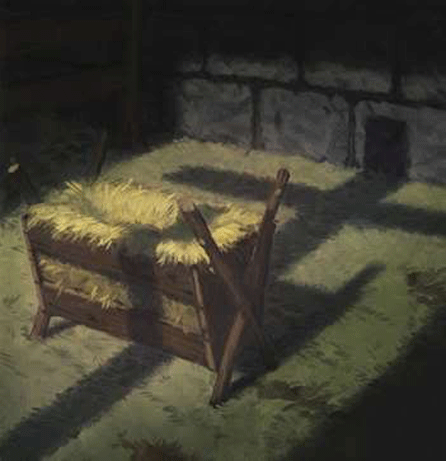
There's something culturally uneasy about pondering death at Christmas, but the birth of Christ set into motion a transformation of death that requires our notice. Advent and Christmas are immersed in thoughts of death transformed. Just have a good look at the Mass readings for Advent and Christmas, and you'll see death everywhere, but in a new light. In last Sunday's Second Reading, for example, Saint Paul wrote to the Romans - and to us:
"You know the time! It is the hour now for you to wake from sleep. For our salvation is nearer now than when we first believed. The night is advanced; the day is at hand. Let us then throw off the works of darkness." (Romans 13: 11-12).
In the Gospel on the day before Christmas from the Canticle of Zechariah:
"In the tender compassion of our God, the dawn from on high shall break upon us, to shine on those who dwell in darkness and the shadow of death, and to guide our feet on the way to peace." (Luke 1:78-79).
Then the Christmas Mass at Midnight quotes a proclamation from the Prophet Isaiah:
"The people who walked in darkness have seen a great light. Upon those who dwelt in the land of gloom, a light has shone . . . For the yoke that burdened them, the pole on their shoulders, and the rod of their taskmaster you have smashed as on the day of Midian." Isaiah 9:1-2).
Last year, I ended my post, "Stigmatized," with “Stay With Me, Lord," a beautiful prayer after Communion penned by Padre Pio, one of the patrons of These Stone Walls. I wrote of him again last September, and of the many deaths he knew, in "Saints Alive! Padre Pio and the Stigmata."In his prayer after Communion, Saint Pio wrote:
"Stay with me, Jesus, for it is getting late; the days are coming to a close and life is passing. Death, judgment and eternity are drawing near. It is necessary to renew my strength, so that I will not stop along the way, and for that I need You. It is getting late and death approaches. I fear the darkness, the temptations, the dryness, the cross, the sorrows."
In "The True Story of Thanksgiving,” I described in detail what I was doing at the age of ten on November 22, 1963 when President John F. Kennedy was killed in Dallas. Last month in "At the Twilight's Last Gleaming," I wrote of the events of September 11, 2001. We who live through the sadness and trauma of such days always seem to remember exactly what we were doing when these events unfolded.In "At the Twilight's Last Gleaming," I wrote of how the scandal in the Catholic Church became a media event in Boston and rippled through the country just weeks after the terrorist attacks of 9/11. It was an awfully painful time for me in prison because we had fought for seven years to revisit my own case, and we made some progress. Then, as Advent commenced in 2001, the scandal in the Catholic Church swept the nation and once again derailed my defense.Additionally, I had spent a year gathering documents as best I could and sending them to The Wall Street Journal where a writer had taken an interest in my case. In the first days of December, 2001, I learned that everything I had collected and sent was among the collateral damage of 9/11. The offices of The Wall Street Journal were near the Twin Towers, and were destroyed when the towers collapsed. Among the far greater tragedies, this set our efforts back many years.YOU KNOW NOT THE DAY OR THE HOUR
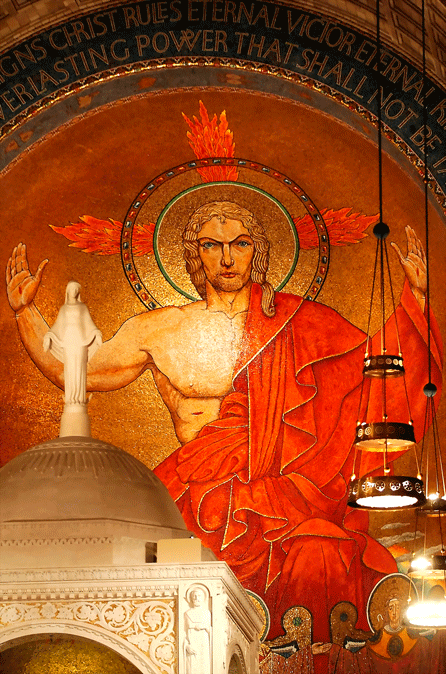
Then death came. It came with stealth and great tragedy to a very dear friend, a co-worker in ministry and my lifeline to the outside world beyond prison. Before I was sent to prison, Father Michael Mack and I shared a home with two other priests and members of the Servants of the Paraclete Order in New Mexico.As I described in "The Mirror of Justice Cracked," when I was falsely accused and faced trial in 1994, Father Mike and the Servants of the Paraclete became the face of the Church for me when the bishop and priests of my own diocese simply fled in fear and panic. On the day that I left that home to face trial in New Hampshire in September, 1994, Father Mike Mack was there at the door to see me off, to give me hope, and to assure me that he would be there as my friend no matter what the outcome.Over the ensuing years in prison, I clung to that promise. Father Mike was a regular correspondent, and we frequently spoke by telephone. I walked with him as he discerned a transition from religious life to ministry as a priest in a rural New Mexico diocese that desperately needed priests. I knew that Father Mike's struggle with his vocation was as much motivated by the needs of the people of that diocese as by his own natural wish for happiness and fulfillment in ministry. As a priest in prison with no options and little sense of priestly purpose, I cherished being able to advise and assist my friend on this journey.In early December, 2001, Father Mike made his decision. He was going to remain a member of the Servants of the Paraclete Order and return to the community’s home where we both once lived. He arrived there late in the night of December 7, 2001, the Eve of the Immaculate Conception, and two weeks before his 60th birthday. It was barely three months after the 9/11 tragedy, and weeks after the first ripples of scandal began to consume the news media, first in Boston and then across the nation.Upon arrival at home that night, Father Mike sat at a small desk and wrote a letter to me describing that he was at peace with his decision and with being home again at last. When he finished the letter, he took it outside to leave in the mailbox for the postman to pick up the next morning. Father Mike returned to the house not knowing that on that very night, just before he arrived, a desperate criminal had broken into the back door with a hatchet, and was hiding in a closet in the very room where Father Mike wrote his last words to me.They came face to face when Fr. Mike returned to the house after mailing that letter. Father Mike's body was discovered in the house the next day. He had been murdered by the blade of a hatchet. No one knew right away that he was there because the killer took his car and fled. Before Father Mike's body was discovered, his letter to me was picked up by the postman and sent on its way.One of the many hazards of prison is that no one can telephone me or send me e-mail. I did not at that time have the support systems that I have been blessed with through Suzanne and Charlene and These Stone Walls. Three days later, I sat at a table just outside my prison cell. Father Mike’s letter had been given to me at mail call that night. I opened it and read every word with joy in my heart at my brother's decision to remain a priest with his community, the Servants of the Paraclete, for indeed, that is exactly what Father Mike was - a servant of the Holy Spirit.Then as I sat there, a prisoner came by and asked me if r wanted to look at the previous day's The Boston Globe to which he subscribed. With Father Mike's letter in my left hand, I scanned the first page of the newspaper, then turned the page. Under the "National News" heading on page two, I quickly spotted a small news item with the heading, "New Mexico Priest Murdered."My eyes naturally scanned down the short paragraph and closed upon sight of the name of Father Michael Mack. I didn't want to see what I was seeing. I just sat there for a moment with my eyes closed, knowing that my heart and my world were being shattered once again. I forced myself to look, and felt my heart breaking as I read. I remember every detail of what was going on around me. It was just devastating, but it didn't seem real. The letter in my left hand sang of life and light and hope while the paper in my right hand took all that away in an instant. There was no one I could call. There was no one I could even tell about what I had just read. There was more than one victim of that murder.When death comes to the loved ones of prisoners, it is a two-edged sword. As the community of my friends and co-workers in ministry bade farewell to Father Mike, and ritualized his suffering and loss, and looked with hope to the restoration of his soul in the beautiful Mass of Christian Burial, I was in a prison cell 2,000 miles away, and completely cut off. As Father Mike's community of priests and brothers and faithful friends gathered to entrust my friend to the Lord, I was consumed with anger at his killer who was found days later with Father Mike's car fleeing through Colorado.He is now serving a life sentence in a New Mexico prison. In the ensuing years, I have had to forgive that man from afar, sight unseen, and believe me that took far more grace than facing Father Mike's death. Sometimes death is easy next to forgiveness.THE ADVENT OF MERCY
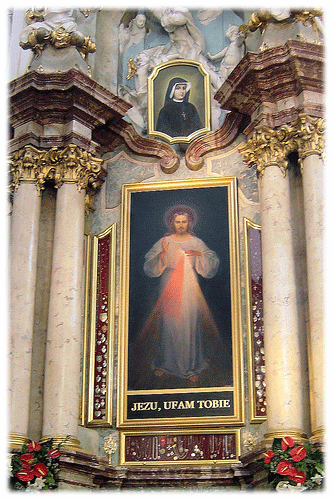
Father Mike Mack was the first editor and publisher of Priestly People, the Servants of the Paraclete monthly newsletter. Our mutual friend, Father Peter Lechner, s.P. wrote of him in the January, 2002 issue:
"In retrospect it seems significant that Mike, who suffered in this life and understood the suffering of others, apparently underwent an intense moment of suffering at the end of his life.In this, he is like many who lead lives dedicated to helping others only to have their own life end in a tragic but inspiring way. Charles de Foucald, Ghandi, Lincoln, Kennedy, Martin Luther King come readily to mind. Most significantly, however, it is Christ Himself - the one who sacrificed His life for all of us - who comes most to mind as we try to understand the tragedy that happened to Father Mike."(Priestly People, January 2002).
Like many in religious life, Father Mike was years earlier asked to prepare his wishes for his own eventual funeral. A copy of the funeral Mass was later mailed to me by Father Peter Lechner, and I was deeply grateful. I was especially moved to see Father Mike's prophetic choice for the first reading. It was exactly what I would have chosen:
"Who shall separate us from the love of Christ? Shall tribulation, or distress, or persecution, or famine, or nakedness, or peril, or the sword? As it is written, 'For your sake we are being slain all the day; we are looked upon as sheep to be slaughtered.' No, in all these things we are more than conquerors through Him who loved us." (Romans 8:35-36).
The sword may have taken Father Mike Mack's life, but it certainly did not separate him from the love of Christ, and it could not separate me from the Gospel of Mercy. More than anything, that fact has called me out of the darkness of anger and grief into the light of forgiveness, trust, and faith in the sure knowledge that my friendship with Father Mike remains intact. He introduced me in that Advent of 2001 to the urgency of the Four Last Things, and I have contemplated them since.The coming of Christ through the womb of Mary into a Bethlehem cradle is but a lifting of a corner of the veil. As my friend Esther – “A Catholic Mom in Hawaii - wrote after my recent post, "At the Twilight's Last Gleaming," this is a time of great trial for people of faith as religious values fade from view all around us. Well, that’s true, but this Advent is the time to find faith anew, to renew it within ourselves, to draw it out, to nurture it, and to reflect Christ at Christmas. Not much else really matters. Last year, when These Stone Walls was in its own infancy, my second Advent post was "Disperse the Gloomy Clouds of Night." It was about Advent in prison which feels a lot like a kind of death. I ended that post with two verses from my favorite Advent hymn, and I have to end this post with the same two verses. I just now realized that I took the titles of both posts from one of those verses. That wasn't intentional, but I think Father Mike Mack would smile to hear them now. Those two simple verses really capture the Four Last Things for which Advent marks the beginning of a long and winding road in friendship with God.Nothing can separate you from it, nothing! Because death's dark shadow is put to flight!
Last year, when These Stone Walls was in its own infancy, my second Advent post was "Disperse the Gloomy Clouds of Night." It was about Advent in prison which feels a lot like a kind of death. I ended that post with two verses from my favorite Advent hymn, and I have to end this post with the same two verses. I just now realized that I took the titles of both posts from one of those verses. That wasn't intentional, but I think Father Mike Mack would smile to hear them now. Those two simple verses really capture the Four Last Things for which Advent marks the beginning of a long and winding road in friendship with God.Nothing can separate you from it, nothing! Because death's dark shadow is put to flight!
O come, 0 come, Emmanuel, And ransom captive Israel,That mourns in lonely exile here Until the Son of God appear.O come, thou Dayspring from on high, And cheer us by Thy drawing nigh; Disperse the gloomy clouds of night, And death's dark shadow put to flight.“O Come, O Come, Emmanuel,” (12th Century, vs. 1 & 6)
